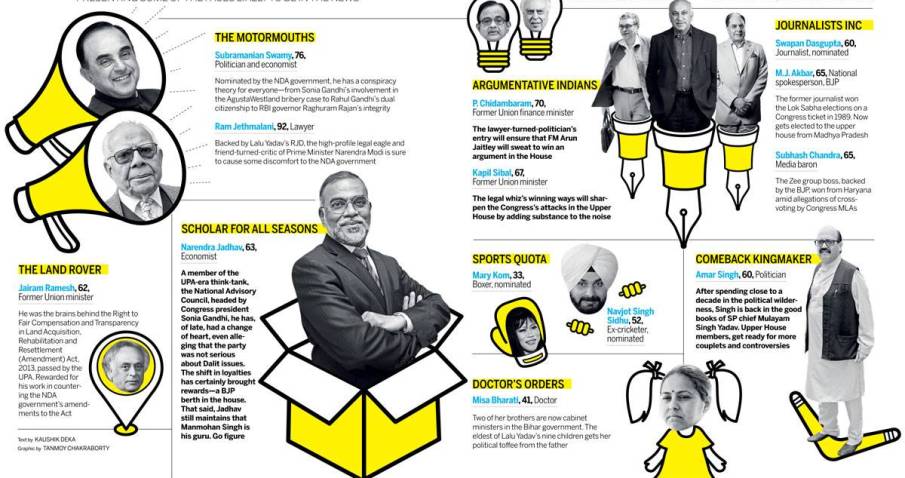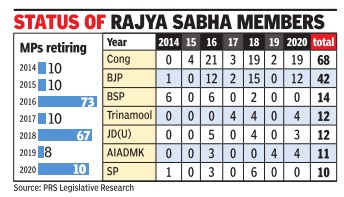Rajya Sabha
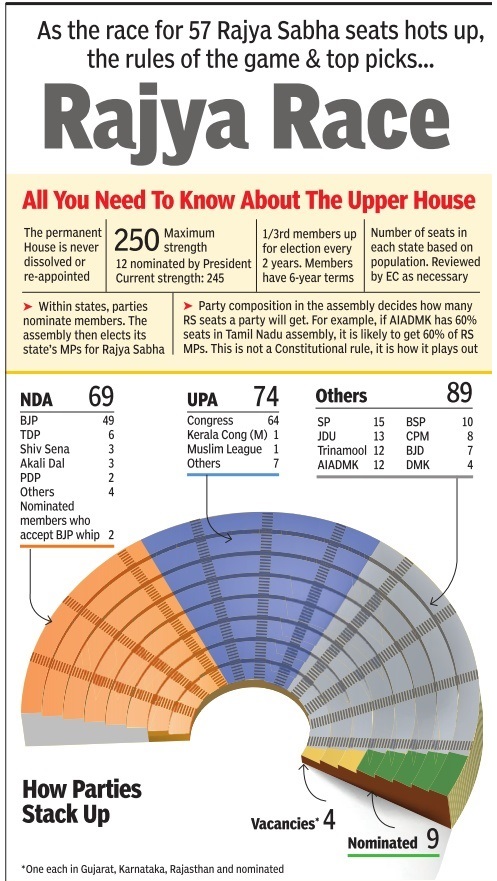
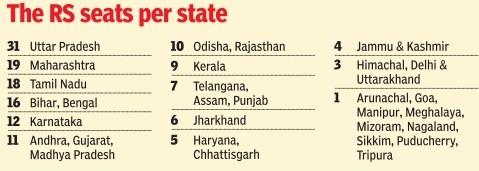
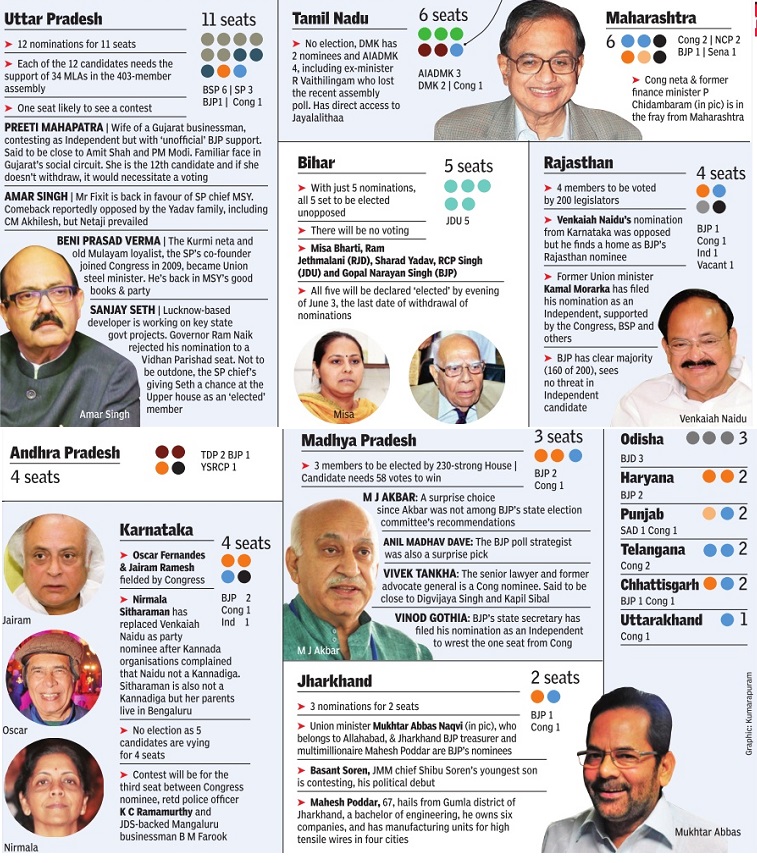
This is a collection of articles archived for the excellence of their content. |
History
1952-2019
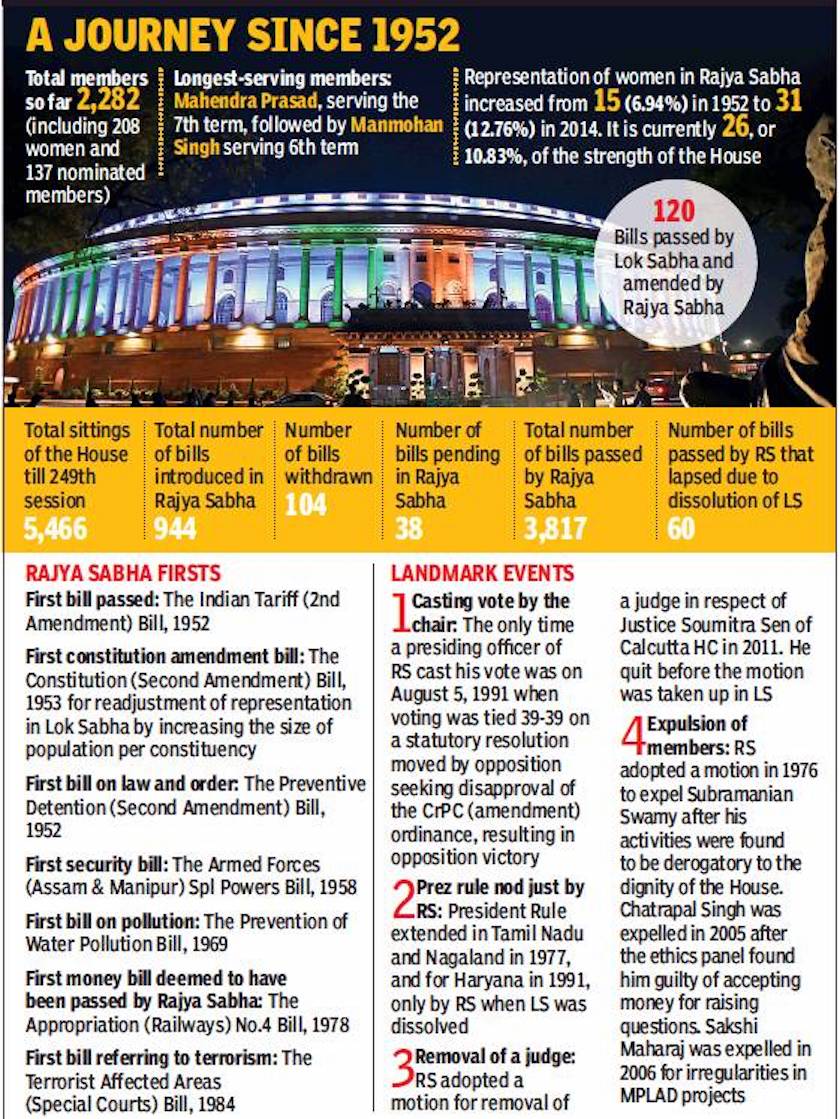
From: Nov 18, 2019: The Times of India
See graphic:
A brief history of the Rajya Sabha, 1952-2019
Deputy Chairman
2018: NDA’s Harivansh wins
Akhilesh Singh, August 10, 2018: The Times of India
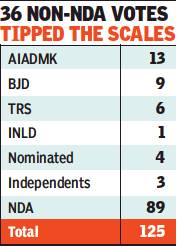
From: Akhilesh Singh, August 10, 2018: The Times of India
The opposition lost the perception battle over the election of the Rajya Sabha deputy chairman with NDA nominee and JD(U) MP Harivansh winning comfortably with 125 votes in his favour while Congress candidate B K Hariprasad polled 101, less than his full quota of votes.
While all NDA votes, along with those of regional parties AIADMK and BJD, were in order, with the addition of Ram Jethmalani, representing RJD, and the lone INLD MP Ram Kumar Kashyap taking the tally to 125, there were as many as 18 absences and abstentions from the opposition.
Three MPs each from Congress and SP and two from Trinamool did not turn up. DMK ranks were depleted too despite two MPs being brought to the capital by chartered flight. Out of the effective strength of 244 members, 226 cast their votes as Jagan Mohan Reddy’s YSRCP (2) abstained and AAP (3), PDP (2) and NPF (1) were absent.
After no-trust, 2nd big win for govt
The result was a setback for Congress, which had forced the showdown after regional parties in the opposition decided not to field a candidate. Congress said the decision to contest should be read in the context of its view that opposition to the Modi government’s policies had to be registered. However, gaps in the opposition benches were a blow to claims of a united front against BJP and the win also helped the party claim that the opposition’s stranglehold over the Upper House had been breached.
Prime Minister Narendra Modi congratulated Harivansh, dwelling on his career as a journalist and author, and described him as a “well-read” person who “has written a lot”. “He has served society for years,” the PM said in the Rajya Sabha after the result was announced.
This was the second instance in recent weeks that the government has managed to ward off an opposition challenge, having won the no-confidence motion with a 300-plus vote in the Lok Sabha despite the lastminute absence by the Shiv Sena with AIADMK’s 37 MPs more than making up the difference. The Rajya Sabha election hung on the BJD’s stance and the Odisha outfit backed Harivansh with its nine MPs. The party had stayed away from the no-confidence motion.
While BJP now has its nominees as President, Vice-President and Lok Sabha Speaker, the RS deputy chairman is with an ally. The successful vote also delivered the benefit of strengthening the political alliance with the Janata Dal (United) in Bihar where the party has been at odds with BJP on several issues, the most contentious being seat-sharing for the Lok Sabha polls. JD(U) has been insisting on power-sharing and early settlement of seat division for the Lok Sabha polls. Cooperation for the Rajya Sabha post indicates that the two sides are ready to sort out claims, complicated by JD(U) having just two sitting MPs but having won many more seats in the state assembly elections. JD(U) is not represented in the Union Cabinet.
Debates
Bills passed with little or no debate
2007-14
‘RS passed 16 bills with little or no debate during UPA era’, September 24, 2020: The Times of India
Rajya Sabha passed at least 16 bills with no debate or as little as over one minute during UPA’s tenure, sources in Rajya Sabha said.
For instance, on December 23, 2008, Rajya Sabha passed the Scheduled Castes and Scheduled Tribes (Reservations in Posts and Services) Bill in just one minute. It was passed in the din without discussion or debate. The Appropriation (Railways) No 5 Bill, 2008, and IT (Amendment) Bill, 2008 were also passed on the same day, in one minute each. These bills were among 16 legislations, passed by the upper House between September 2007 and February 2014 when UPA government was in power, in which the time taken to pass the bills ranged from just one minute to a little over three hours, sources said.
In September 2007, legislations like the Competition (Amendment) bill, was passed amid din in two minutes.
Legislative work
Pending bills: 1987-2019
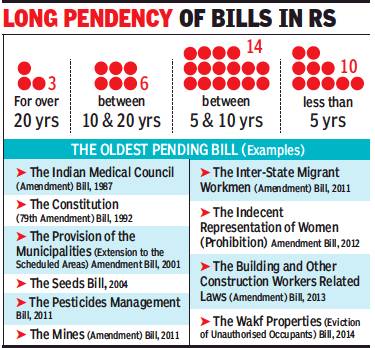
From: Dipak Dash, June 22, 2019: The Times of India
See graphic :
Bills pending in the Rajya Sabha: 1987-2019
2017-19: 8 of 10 bills tabled sent for scrutiny
Swati Mathur, July 28, 2019: The Times of India
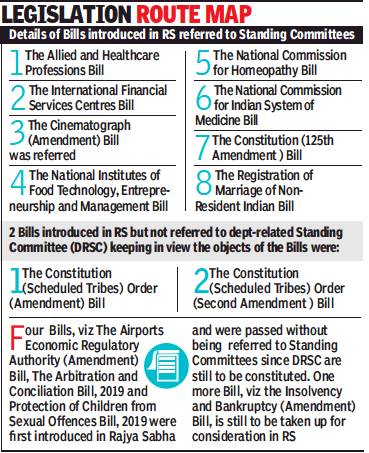
From: Swati Mathur, July 28, 2019: The Times of India
Ten bills were introduced in Rajya Sabha in the last two years since Vice President Venkaiah Naidu took over as chairman of the House and until the end of the last session, of which eight were referred to the department-related standing committees, government sources said.
One more bill — the Motor Vehicles (Amendment) bill — which was introduced in and passed by Lok Sabha after being scrutinised by a standing committee was sent to Rajya Sabha. The upper House then referred the bill to select committee.
Opposition parties have been protesting against the government passing legislations without allowing them to be scrutinised by standing or select committees and shot off a letter to Naidu, which stoked a debate over the procedures that govern bills being referred to parliamentary panels.
In the 17th Lok Sabha, while Speaker Om Birla has constituted the Public Accounts Committee and Committee on Public Undertakings — both joint parliamentary panels — both Houses are yet to constitute departmentrelated standing committees.
This has triggered loud protests by opposition MPs in Lok Sabha and Rajya Sabha alleging that parliamentary democracy is being undermined by the government and that bills are being passed in a hurry.
Government sources said rules governing referral of bills to parliamentary panels are clear in that only the House in which a bill originates can refer it to a standing committee. For instance, if a bill is first introduced in Rajya Sabha, it can be considered for being referred to the standing committee concerned by the upper House. Similarly, if a bill is first introduced in Lok Sabha and passed by it before being transmitted to the upper House, Rajya Sabha cannot send it to a standing committee. It can, however, refer a bill to a select committee of the upper House.
Election of MPs
Secret ballot and cross-voting: a backgrounder
The Constituent Assembly took a policy decision on July 28, 1947 that the Federal Parliament shall consist of two chambers. The Council of States, or the Upper House, took birth on April 3, 1952 and held its first sitting on May 13, 1952. It was rechristened as ‘Rajya Sabha’ on August 23, 1954. RS was created to bring into Parliament the experienced and seasoned men of integrity and achievement, without subjecting them to din and bustle of general elections, to enhance quality of debates and legislations.
Not many years later, indirect elections to Rajya Sabha got mired in controversy, and there were talks about money and muscle power having a significant play in influencing the voting through secret ballot. Senior Congress MP Bibhuti Mishra introduced a Private Member’s Bill in Lok Sabha on March 30, 1973 for abolition of Rajya Sabha on ground that elections to RS have been mired in corruption.
Everyone knew at that time how the secret ballot was an open invitation for corruption during voting to elect a Rajaya Sabha member. However, the attempt to introduce the Bill for abolition of RS drew adverse public opinion and the leaders in Parliament referred the issue to Ethics Committee of Parliament headed by S B Chavan.
The Committee report, adopted on December 15, 1999, made startling findings. “The Committee has also noted the emerging trend of cross-voting in the elections for Rajya Sabha and the Legislative Councils in States. It is often alleged that large sums of money and other considerations encourage the electorate for these two bodies to vote in a particular manner leading
sometimes to the defeat of the official candidates belonging to their own political party. In order not to allow big money and other considerations to play mischief with the electoral process, the Committee is of the view that instead of secret ballot, the question of holding the elections to Rajya Sabha and the Legislative Councils in States by open ballot may be examined.”
The feeling of the political parties, whose members in Parliament, over cross voting in RS polls was best described by Griffith and Ryle in “Parliamentary Functions, Practice and Procedures”, in which they said: “To abstain from voting when required by party to vote is to suggest a degree of unreliability. To vote against party is disloyalty. To join with others in abstention, or voting with the other side, smacks of conspiracy.”
A case in point: Liquor baron Vijay Mallya got elected to Rajya Sabha in 2002 as an independent from Karnataka with support of Congress and Janata Dal (Secular). He had joined Subramanian Swamy-led Janata Party and was later appointed as working President. He was removed from the post by Swamy after Mallya got elected again to Rajya Sabha in 2010, this time with the backing of BJP and JD(S).
The NDA government successfully pushed a Bill for amendment of Representation of People Act and brought in ‘Open Ballot” system. The effect of this was that before a MP or a MLA inserts the ballot paper into the ballot box, authorized agents of the political party shall be allowed to verify whom s/he voted for. If s/he refuses to show the ballot paper, the same shall be invalidated, thus compelling her/him to show it to the authorized agent of the party.
This ‘Open’ ballot process was challenged in SC by Kuldip Nayar alleging that it stifled free speech and expression of a voter, which is at the core of democracy. A five-judge bench led by then CJI Y K Sabharwal unanimously upheld the constitutional validity of the ‘open ballot’ system on August 22, 2006 and said: “if secrecy becomes a source for corruption, then sunlight and transparency have the capacity to remove it.”
It said: “Voting in elections to Council of States cannot be compared with a general election. In a general election, the elector have to vote in a secret manner without fear that their votes would be disclosed to anyone or would result in victimization. There is no party affiliation and hence the choice is entirely with voter. This is not the case when elections are held to the Council of States as the electors are elected members of the legislative assemblies who in turn have affiliations.”
To deal with money and muscle power engineering splits in political parties and defections, parliament had enacted anti-defection law to combat this political evil.
This provided for disqualification of an MP or MLA if s/he “votes or abstains from voting” contrary to the directions of her/his party. The long and short of it was that a MP or a MLA cannot do conscience voting, only permitted during Presidential elections, in Parliament over any issue.
However, the anti-defection law is not applicable to RS elections.
If parliamentarians thought, they will name and shame those MPs and MLAs who cross-vote despite ‘open ballot’ system, then their hopes have been belied. The recent Rajaya sabha elections and the manner in which cross-voting happened in Uttar Pradesh , Jharkhand and Karnataka would have dawned a realization on many that, the voters in such elections have successfully defied both the secret and open ballot systems.
Defiance against party line has happened in other countries too: In United Kingdom we saw this over Brexit and in US over healthcare Bill. But, in India, Rajya Sabha elections continue to be an incurable enigma.
Rules
Rejecting a vote
June 10, 2022: The Indian Express
Members of the Rajya Sabha are elected through single transferable votes via an open ballot. Members of a state’s Legislative Assembly vote in the Rajya Sabha elections in what is called proportional representation with the single transferable vote (STV) system. Each MLA’s vote is counted only once.
There have been multiple instances in the past where the votes of MPs and MLAs have been rejected due to violation of rules.
When the Election Commission turned to Article 324
In 2017, with the high-stakes Rajya Sabha election in Gujarat touching a nerve-racking finishing, the counting was delayed in three seats after the Congress asked the Election Commission (EC) to reject the votes of two of its rebels, who allegedly showed their ballot papers to unauthorised persons in the polling booth in Gandhinagar.
Later, in a boost to the Congress party and its candidate Ahmed Patel, the EC disqualified two votes by Congress MLAs that were in favour of the BJP. The commission’s order was made after the Congress petitioned it saying the two MLAs showed their votes to a BJP agent and therefore, stood invalid. The two MLAs were Bhola Bhai Gohil and Raghav Bhai Patel.
The commission had invoked its constitutional powers to overrule the returning officer, who had declared the votes valid, and by doing so maintained the panel’s neutrality.
The commission turned to Article 324 of the Constitution, which gives the panel unprecedented powers to hold free-and-fair polls in situations not covered by the Representation of People’s Act, the law governing the election process in India.
How can votes be rejected in an open ballot system?
Open ballot voting applies in elections to Council of States only. Every political party which has MLAs can appoint an authorised agent to verify whom its members have voted for.
In 2016, Randeep Surjewala’s vote was rejected after he showed it to another MLA instead of his party’s authorised agent. Surjewala was an MLA in the 2016 Rajya Sabha elections in Haryana.
Can an authorised agent represent two parties simultaneously?
No. The spirit behind Rule 39AA of the Conduct of Elections Rules, 1961 is that MLAs belonging to a political party shall show their ballot papers (after marking their vote) to the authorised agent of that party only and not to the authorised agent of other parties. As such, the same person cannot be appointed as the authorised agent of more than one party.
Can an MLA or minister be appointed as an authorized agent?
There is no such restriction imposed by the EC in elections to the Council of States and State Legislative Council by MLAs.
Can an Independent MLA show his marked ballot paper to the authorised agent of any party?
No, Independent MLAs are required to insert the marked ballot paper in the ballot box without showing the marked ballot to any agent.
What action is taken by the Presiding Officer/Returning Officer in case an elector belonging to a political party refuses to show his/her marked ballot paper to the authorised agent?
In such a case, the ballot paper issued to the elector will be taken back by the Presiding Officer, or a polling officer under the direction of the Presiding Officer, and the ballot paper will be kept in a separate envelope after recording on the reverse side of the ballot paper “Cancelled-voting procedure violates”. A provision in sub-rules (6) to (8) of rule 39A of the Conduct of Elections Rules, 1961, shall apply in such cases.
According to the EC, if the elector drops the ballot paper in the box without showing it to the authorised agent, then at the time of counting, the RO should first separate this concerned ballot paper and it shall not be counted.
Can votes be rejected if a ballot paper is marked with another pen?
Yes, in the ballot paper, a MLA has to mark his or her choice of candidates by ranking them and they also have to use a special pen provided by the EC. If they use any other pen, or if their ballot papers remain incomplete, the vote would be regarded as invalid.
In 2016, the EC directed the Haryana Police to register an FIR on the complaint of senior lawyer R K Anand against the Returning Officer for allowing the use of an unauthorised pen for voting in the Rajya Sabha election. The Congress party had alleged this was a deliberate fraud to make the party’s votes invalid.
Dispute in 2017
CEC went by rulebook to invalidate two votes, August 10, 2017: The Times of India
The entire Gujarat bureaucracy was talking animatedly about how Chief Election Commissioner Achal Kumar Joti mustered the courage to defy BJP by invalidating the votes of two rebel Congress legislators.
Gujarat bureaucrats, who have worked with Joti or known him, weren't surprised. They said Joti, a soft-spoken and conservative academic, is a stickler for rules. A 1975 batch IAS officer of Gujarat cadre, he had also served as Gujarat chief secretary .
When Congress demanded invalidation of two votes cast in BJP's favour in the Rajya Sabha polls, Joti's junior colleagues in Gandhinagar knew that the results were unlikely to be announced before midnight. Because Joti “will go by every word in the rule book,“ said a senior IAS officer who had worked with him for 17 years. When TOI asked Chief Election Commissioner Achal Kumar Joti about how he had resolved Tuesday's tangle related to Gujarat's Rajya Sabha election results, he said, “We took the legal position after examining the complaint, listening to delegations of both the parties, considering the returning officer's report, and watching video records. We then decided to invalidate the two votes.“
He added that before invalidating the votes, the EC had gone through the legal provisions and previous circulars issued on similar matters. On Tuesday , even as the tense drama was on, Joti's colleagues were intrigued by the rumour that the CEC may have consulted the PMO before going by the rule book.
Joti's decision has been subject to various interpretations. One view is that the EC had no option in the face of video evidence.
A voter showing his ballot to a person other than the authorised polling agent was clearly a violation of the secret ballot rule.
Earlier in July this year, a spate of resignations by Congress MLAs had left the party with few options and Ahmed Patel's defeat seemed inevitable. It may be recalled that some Congress MLAs had voted for NDA candidate Ram Nath Kovind even in the presidential election. Hence, this time, the Congress was better prepared to counter BJP's plans. During the dispute over validity of two votes, the BJP had put forward four sets of arguments before the Election Commission (EC) of India, all of which were rejected one by one in the final order issued by the EC on Tuesday night. The first submission was that the secrecy of ballot principle did not apply to a vote in elections to the Rajya Sabha. The BJP argued that once the vote is revealed, even if only to the authorised party agent, the vote no longer remains secret.
The EC however rejected this argument saying that open ballot only meant that the vote was to be shown to the party agent and none other.
Secondly , the BJP argued that the nowhere did Section 39AA of Conduct of Election Rules prefix `only' with the `authorised party agent'. The rea soning behind is that unless expressly stated in the rules that `only' the agent can be shown the vote, it was perfectly valid to show it to others.
The BJP's third contention was that the EC's jurisdiction ended after the ballot had been cast and inserted in the ballot box. Beyond this point, only the high court could intervene, the party had claimed.But the EC disagreed saying that its sweeping powers of superintendence over elections extend right up to the declaration of results.
Fourth, the BJP questioned as to why the returning officer or authorised party agent had not found anything amiss when the ballot was being cast and raised the matter only later when it was apparent that the Congress did not have the requisite numbers.The EC, however, said it had the final word on disputes regarding conduct of elections and that the returning officer was required to get a go-ahead from EC, first to start the counting and finally for declaration of the results.
Joti, a 1975 batch IAS officer, served in various capacities in Gujarat, including as chairman, Kandla Port Trust (KPT) between 1999 and 2004.He is given the credit for putting the KPT back on track in just 21 days after the 2001 earthquake and after a cyclone. “He knew most junior engineers and even peons by name. In fact, anyone could walk into his office and discuss with him,“ says a former retired KPT colleague.
Joti has also served as chairman of Gujarat State Petroleum Corp Ltd and Gujarat State Fertilizers & Chemicals Ltd. He was also a secretary of industry , revenue and water supply departments.Prior to becoming the Gujarat chief secretary in January 2010, Joti headed the Sardar Sarovar Narmada Nigam Ltd.After his retirement in January 2013, he served as Gujarat vigilance commissioner.
One of Joti's junior IAS colleagues recalls that in December 2009, Joti had come under the spotlight when CM Narendra Modi first indicated that he may make Joti the state's next chief secretary.Ignoring Balwant Singh, who was senior ACS (home) at the time, Modi had praised Joti for his “exemplary work“ by remaining in rural areas till late in the evening.
2018: poll-station layout changed
In order to ensure that legislators voting in an RS election show their marked ballot only to an authorised party representative, the EC has proposed a revised layout of the polling station that will provide the electors a ‘secure corridor’ to the ballot box.
The changed layout is aimed at avoiding a repeat of theconfusion that marked the election of senior Congress leader Ahmed Patel to the Rajya Sabha in August last year. Two Congress MLAs from Gujarat - Bhola Bhai Gohil and Raghavji Patel - had then violated the voting procedure by allegedly showing their marked ballot paper to persons other than the authorised party representative. The EC cancelled their votes on the ground of violation of voting norms.Patel finally emerged winner.
In a letter written tochief electoral officers of all states and UTs in December 2017, the EC shared details of the new proposed layout of polling station and sought their comments. If finalised, the new layout may be implemented in the polls to 59 Rajya Sabha seats in April.
As per the proposedlayout, an MLA will not have interface with any person other than the authorised party representative as he carries his marked ballottotheballotbox. Also, the layout will ensure uniformity in voting procedure followed in polling stations across the country. As per Rules 39A and 39AAof the Conduct of Election Rules, 1961, the marked ballot paper can only be shown by a voting MLA to the authorised representative of the political party to which he/she belongs.
By-elections
Separate elections for individual seats, 1956-2009
AmitAnand Choudhary, June 25, 2019: The Times of India
The Election Commission told the Supreme Court that there is no illegality in holding separate bypolls to two Rajya Sabha seats in Gujarat, a procedure that has been followed since 1957, and sought dismissal of Gujarat Congress’ plea for simultaneous polls for the two seats that fell vacant after the election of BJP chief Amit Shah and Smriti Irani as Lok Sabha members.
In an affidavit filed in the SC, the EC refuted the Congress allegation of bias and brought to the court’s notice its earlier decisions of holding separate polls in byelections for RS seats in 2006 and 2009. It said HCs of Delhi and Bombay had delivered judgments in its favour for holding separate polls.
The Delhi HC had adjudicated a similar issue in 2009 on bypolls for two RS seats from Uttar Pradesh that fell vacant due to disqualification of Jaya Bachchan and resignation of Anil Ambani in 2006. At that time, the EC issued separate notifications for two seats, which was challenged. The HC dismissed the plea saying: “There cannot be any doubt that in so far as the casual vacancy is concerned, holding of joint election is not mandatory even if more than one casual vacancy occurred at the same time.”
The EC was responding to the petition filed by leader of opposition in Gujarat assembly, Pareshbai Dhanani, who sought quashing of the EC’s June 15 notification treating the two seats as stray vacancies to warrant separate polls.
June 2020 Elections
43 first time MPs
Swati Mathur, June 20, 2020: The Times of India
With 43 firsttime MPs set to enter Rajya Sabha after biennial elections, the House of Elders is likely to get younger. But the House will also end up losing about 63 terms worth of collective experience.
This is because 61 members who are due to retire from the Upper House in June have a total collective experience of 95 terms. In contrast, the new incumbents have a cumulative experience of 32 terms, resulting in a sharp decline in collective experience.
Against the 61 vacancies created by retiring members, while 42 were filled by MPs who were elected unopposed, elections to the remaining 19 vacancies were held.
The drop in the total experience in respect of four vacancies in Andhra Pradesh is six terms, followed by five terms in respect of six vacancies in Tamil Nadu, four terms in case of four vacancies in Gujarat and four terms in Odisha with all the four new members being first-timers.
The prominent first-timers entering the Upper House include BJP’s Jyotiraditya Scindia, Congress’ Mallikarjun Kharge and KC Venugopal, former Lok Sabha deputy speaker M Thambidurai and former Speaker of the composite Andhra Pradesh assembly KR Suresh Reddy.
Six members entering Rajya Sabha have been members of the Upper House earlier and include GK Vasan, Dinesh Trivedi and Nabam Rabia (it will be third term for them) and former PM Deve Gowda, Shibu Soren (second term).
State-wise, the four members who retired from Karnataka had a total experience of nine terms in Rajya Sabha while the new incumbents have a total experience of only one term in the election of Deve Gowda with the other three being first-timers.
In the case of Maharashtra, while seven members with a collective experience of 10 terms retired, the new incumbents account for an experience of only two terms with the re-election of Sharad Pawar and Ramdas Athawale.
37 candidates elected unopposed
Pawar, Athawale, 35 others elected to RS, March 19, 2020: The Times of India
Election To 18 Other Seats On March 26
New Delhi:
NCP chief Sharad Pawar, Union minister Ramdas Athawale and Rajya Sabha Deputy Chairman Harivansh Narayan Singh were among 37 candidates elected unopposed to Rajya Sabha as the deadline for withdrawal of nomination ended.
Nominations had been filed for 55 Rajya Sabha seats in 17 states for the March 26 election.
Out of these, candidates were declared elected unopposed to all seven seats in Maharashtra, six seats in Tamil Nadu, two seats each in Haryana, Chhattisgarh and Telangana; four seats in Odisha, five seats each in Bihar and West Bengal; three seats in Assam and one seat in Himachal Pradesh by the returning officers as no other candidates were in the fray.
Priyanka Chaturvedi, who had quit Congress last year and joined Shiv Sena, AIADMK leader and former Lok Sabha deputy speaker M Thambidurai, Tamil Maanila Congress president G K Vasan, veteran lawyer K T S Tulsi and Congress party’s Deepender Singh Hooda were among other prominent candidates elected to the Upper House.
BJP bagged seven seats — two in Haryana, three in Maharashtra and one each in Himachal Pradesh and Bihar.Its allies JD(U) got two (from Bihar), AIADMK two (Tamil Nadu) and BPF one (Assam).
Congress got four seats. Its allies RJD got two (Bihar), DMK got three (Tamil Nadu), NCP bagged two (Maharashtra) and Shiv Sena got one (Maharashtra). Elections will be held on March 26 for the remaining 18 Rajya Sabha seats.
NCP leader Pawar and Union minister of state for social justice Ramdas Athawale, both sitting members, were among seven elected unopposed to Rajya Sabha from Maharashtra. RPI leader Athawale was backed by BJP.
All five candidates in Bihar — two each belonging to JD(U) and RJD and one from BJP — were declared unopposed as no other candidates had filed nomination. The RJD candidates are Prem Chand Gupta, a close aide of Lalu Prasad, and Amarendra Dhari Singh, an entrepreneur not known for prior involvement in politics. PTI
November 2020 elections
Akhilesh Singh, November 3, 2020: The Times of India

From: Akhilesh Singh, November 3, 2020: The Times of India
With nine of 11 Rajya Sabha MPs elected belonging to BJP, the party has touched a high of 92 MPs in the upper House, a major feat given the challenges it had to face in getting key legislations passed in its first term.
Congress numbers have fallen to 38, a new low for the party, with its combined strength in Parliament — including the Lok Sabha — at just 89. The gap between BJP and Congress in the Rajya Sabha is also at its widest ever.
BJP fielded new faces from UP in RS elections
In Lok Sabha, Congress lacks representation from J&K, Himachal Pradesh, Uttarakhand, Haryana, Delhi, Rajasthan, Gujarat, Andhra Pradesh, Sikkim, Arunachal Pradesh, Tripura, Nagaland, Mizoram and Manipur, a BJP member said. Housing minister Hardeep Singh Puri, BJP general secretary Arun Singh and son of late Chandra Shekhar, Neeraj Shekhar, were among those elected from Uttar Pradesh on Monday. Ram Gopal Yadav (Samajwadi Party) and Ramji Gautam (BSP) were also elected. BJP’s Naresh Bansal was elected unopposed from Uttarakhand.
With 92 BJP MPs, NDA is strongly placed in Rajya Sabha and the alliance’s strength has risen to 110, which includes five of JD (U) and four nominated MPs. Besides, AIADMK (9), TRS (7), YSRCP (6) and BJD (9) have supported the government on several occasions barring some instances like the recent farm bills.
In UP, BJP top brass has not only addressed the compulsions of caste equations in selection of candidates but has also nominated new faces like Haridwar Dubey, Seema Dwivedi, Geeta Shakya, B L Verma and retired IPS Brij Lal. Dubey was a minister in the Kalyan Singh government in 1991. Hailing from Agra, he had been a three-time MLA but has been in the shadows since. Shakya has been a key organisational worker in UP unit and has held the charge of state secretary (organisation) in the past. Until last year, Shakya was Auraiya district president.
BJP lets go of one RS seat to cosy up to Mayawat
New Delhi/Lucknow: In what is seen as a shift from its “take-no-prisoners” approach, BJP decided to forego one Rajya Sabha berth it could have bagged in UP to facilitate the election of BSP’s national coordinator, Ramji Lal Gautam to the upper House — a move which can help it resist being cast as “anti-Dalit” and can potentially change equations in the most populous state.
The switch from the approach so far to maximise its returns has already fetched it dividends in the form of BSP chief Mayawati softening her stance towards the “secular” formation. Although she emphasised BSP’s ideological opposition to BJP, she made it clear that for her, it is now SP which is the main opponent. TNN
2022
NE
Prabin Kalita, April 1, 2022: The Times of India
Guwahati: BJP and one of its allies won all four Rajya Sabha seats from the northeast up for grabs, leaving Congress without any representation from the region in the Upper House for the first time in parliamentary history.
While BJP won the Tripura seat on the sheer strength of its numbers and the Nagaland seat uncontested, crossvoting and invalid opposition votes in Assam helped the saffron party and its ally UPPL win both the seats to which elections were held.
“Our strategy was to bank on the conscience of legislators. We have got seven votes from Congress MLAs,” Assam CM Himanta Biswa Sarma said. In the 126-member assembly, BJP and its allies were short of four votes needed to win both Rajya Sabha seats, while the opposition appeared to be comfortably placed to win the one seat it was contesting. BJP’s Pabitra Margherita and UPPL’s Rwngra Narzary won the two seats from Assam, while Congress candidate and sitting Rajya Sabha MP Ripun Bora, who was the common candidate of a united opposition, suffered defeat. After Thursday’s verdict by legislators of the three states, the NDA now holds 13 of the 14 seats in the Upper House from the region. One seat from Assam is held by an Independent.
BJP also won the Nagaland seat uncontested, which was held by it ally NPF. CPM lost its seat in Tripura to BJP. In Tripura, BJP nominee and party’s state president Manik Saha won by defeating CPM candidate, former minister and sitting MLA Bhanu Lal Saha. In Nagaland S Phangnon Konyak of BJP scripted history in the state politics by becoming the first woman to be elected to the Rajya Sabha.
Counting of votes for the two Rajya Sabha seats from Assam had been delayed by over five hours after the EC initiated a hearing on complaints by Congress that five MLAs, including three from BJP, allegedly violated the election rules. Counting started at 10. 25pm, after the EC rejected all complaints.
Congress lodged complaints with the EC that its suspended MLA Sashikanta Das, BPF legislator Durgadas Boro and three BJP MLAs — Hitendra Nath Goswami, Ganesh Limbu and Sanjay Kishan — have violated the rules of election while casting their votes.
June A
Subodh Ghildiyal & Bharti Jain TNN, June 11, 2022: The Times of India

From: Subodh Ghildiyal & Bharti Jain TNN, June 11, 2022: The Times of India
New Delhi : Congress notched a major victory in Rajasthan where all three party candidates for Rajya Sabha seats romped home, while the results in Karnataka were a legup for BJP which won three seats, including a bonus. The saffron party bagged the third seat eyed by JD(S), because the Gowda outfit could not arrive at an understanding with Congress. Congress cornered its sole guaranteed seat of Jairam Ramesh. Union minister Nirmala Sitharaman was among the three BJP candidates who won.
But the election was mired in controversy in Haryana and Maharashtra where counting was withheld over BJP’s petition to the Election Commission that rival votes be scrapped for violation of secrecy of ballots. It sought disqualifica- tion of two Congress votes in Haryana (Kiran Choudhary and BB Batra) and three ruling MVA votes in Maharashtra — Jitendra Awhad (NCP), Yasho- mati Thakur (Congress) and Shiv Sena’s Suhas Kande. Congress contested the allegation in the EC. Late night, the EC allowed counting in Haryana while in Maharashtra it did so after rejecting the vote cast by Kande.
Cong-JD(S) fight gives BJP 3rd seat
Despite lacking numbers, BJP won a third seat in Karnataka as Congress and JD(S) fell apart. JD(S), some of whose MLAs cross-voted, drew a blank.
Chandra accepts defeat before result
BJP-backed Independent candidate Subhash Chandra left the battle in Rajasthan much ahead of the results. Chandra, who needed 41 votes to win, managed only 30.
No HC relief, Malik doesn’t get to vote
Maharashtra minister Nawab Malik, in judicial custody in a laundering case, could not vote in the RS polls as two benches of Bombay HC did not entertain his plea.
June B
June 12, 2022: The Times of India

From: June 12, 2022: The Times of India
New Delhi: BJP overcame the handicap of numbers to wrest two crucial Rajya Sabha seats in Maharashtra and Haryana in a humdinger of an outcome of a hand-tohand combat against Congress and its other opponents.
BJP’s Dhananjay Mahadik prevailed against ruling MVA candidate Sanjay Pawar of Shiv Sena, while saffron-backed Independent Kartikeya Sharma, brother of Manu Sharma who was convicted in the Jessica Lal murder case, managed to get the better of Congress’s nominee, Rahul Gandhi-loyalist Ajay Maken, in Haryana.
With BJP bagging 22 of the 57 seats that went to polls, the strength of the ruling party in the Upper House of Par- liament now stands at 92, three less than what it had before the biennial polls.
2024
August
Vishwa Mohan, August 28, 2024: The Times of India
New Delhi : The NDA reached the majority mark in Rajya Sabha on its own for the first time since it assumed office in 2014 with BJP winning nine seats and its allies two in bypolls to 12 seats in the latest round. All candidates were elected unopposed.
BJP now has 96 seats in the House of 245. Eight seats — four in J&K and four in the nominated category — are still lying vacant. Along with allies and the support of six nominated and two Independent members, NDA has touched the majority mark of 119. With its improved tally, NDA can get any legislation passed without having to enlist the support of friendly non-NDA, non-UPA parties. In its last term, Modi govt had to depend on either YSRCP (11 members), BJD (8) or AIADMK (4) to get the required numbers in RS. NDA reaching the majority mark on its own is crucial given the uncertainties attached to YSRCP and BJD which have decided to side with the opposition this time.
If nominations go BJP’s way, NDA’s RS tally can hit 123
Since nominated members invariably go with the governing party, govt has one more window to increase its lead once it nominates four members to the vacant seats. In that case, NDA’s tally with support of nominated and independent MPs will reach 123 — two more than the majority mark in the House of 241.
Congress’ Abhishek Manu Singhvi won the lone seat from Telangana unopposed, with the party reaching 27 in the Upper House — two more than what it needs to retain its leader of opposition post in Rajya Sabha. Before the bypolls, the party had 26 members, putting the fate of leader of opposition Mallikarjun Kharge hanging by a thread.
In the bypolls, BJP won one seat each from Madhya Pradesh (George Kurian), Rajasthan (Ravneet Singh Bittu), Odisha (Mamata Mohanta), Tripura (Rajib Bhatta- charjee), Maharashtra (Dhairyashil Patil), Bihar (Manan Kumar Mishra) and Haryana (Kiran Choudhry), and two from Assam (Rameswar Teli and Mission Ranjan Das) whereas its allies won one seat each from Bihar (Upendra Kushwaha of Rashtriya Lok Manch) and Maharashtra (Nitin Patil of NCP). Ten of the 12 seats fell vacant as sitting BJP, Congress and RJD members from seven states were elected to Lok Sabha while one member each from Telangana and Odisha resigned and switched to other parties. In Telangana, BRS member K Keshava Rao resigned and joined Congress while in Odisha BJD’s Mamata Mohanta resigned and joined BJP.
Expunging remarks
2020: A word from PM’s speech is expunged
In a rare move, a word from PM’s speech in RS is expunged, February 8, 2020: The Times of India
In a rare move, a word from PM Modi’s speech in Rajya Sabha was expunged from the records. Rajya Sabha Chairman M Venkaiah Naidu expunged the word used by Modi on Thursday during his reply to the discussion on a motion thanking the President for his address to the joint sitting of both Houses of Parliament at the start of the Budget session.
“The Chairman was pleased to direct expunction of a certain portion of the proceedings of Rajya Sabha dated February 6 at about 6.20 and 6.30pm,” Rajya Sabha secretariat said. Modi had made the remark while launching a defence of the National Population Register saying it was being updated with demographic information for better targeting of government’s welfare schemes.
Naidu also expunged a word from leader of the opposition and Congress member Ghulam Nabi Azad’s statement made after Modi’s speech. Azad had stated that the Congress was in favour of giving citizenship to persecuted migrants from Pakistan but was against framing of a law based on religion.
Marshals
Uniform changes to military green

From: Nov 19, 2019: The Times of India
See picture:
The traditional Indian suits and tall turbans with a plume were gone, replaced by new military-style uniforms with peaked caps and lanyards for Rajya Sabha marshals. The new uniforms not only surprised many MPs but also led to some consternation in military circles. “Copying and wearing of military uniforms by non-military personnel is illegal and a security hazard,” tweeted former Army chief General V P Malik
The new uniform resembles military and civil uniforms. Now the new look has some military essence with a cap, however the colour is a bit changed with the olive green hue.
On the first day of the winter session of Parliament, Rajya Sabha members were surprised with the new uniform of the marshals standing beside the seat of Chairman as earlier it was a turban with Indian attire.
The new uniform resembles military and civil uniforms. Now the new look has some military essence with a cap, however the colour is a bit changed with the olive green hue.
The Rajya Sabha is completing its 250th session this year. The house has 245 members and was constituted in 1952. On November 26, the Constitution will complete 70 years. A joint session has been summoned for the occasion.
Old dress back, minus the turban
Bharti Jain, Nov 26, 2019: The Times of India
The old dress code of Rajya Sabha marshals made a comeback as they were seen once again in their traditional dark-colour bandhgalas, though minus the turbans. Sources said the ‘pagdi’ was excluded to distinguish the marshals from the watchand-ward staff.
This followed a decision by RS chairman to discontinue the marshals’ new militarystyle uniform and restore status quo ante until the new dress code had been reviewed in the light of objections raised by some politicians and ex-Army officers. Sources told TOI that a committee of experts shall be set up soon to review all issues relating to uniforms of Rajya Sabha marshals as well as of the watch-and-ward staff. “Until then, the Chair has decided that the original dress code of the marshals should be restored. Once the committeereviews the blue uniform introduced at the start of this session, the new dress code can be reintroduced,” said an officer.
Nominated members
Questions over absence of Sachin, Rekha in RS| Mar 31 2017 : The Times of India (Delhi)
SP member Naresh Agarwal pointed out, “There are 12 nominated members in RS according to provisions of the Constitution. The council of ministers recommends their names after which President nominates them. These people have been nominated to represent Parliament but we don't see them (in the House).“
Why does RS have ‘nominated’ MPs? Who gets nominated?
July 7, 2022: The Indian Express
The Constitution allows for 12 nominated members in Rajya Sabha with those favourable to ruling parties often getting the nomination.
What does the Constitution say about nominated members?
Article 80 of the Constitution (“Composition of the Council of States”) says “The Council of States shall consist of (a) twelve members to be nominated by the President in accordance with the provisions of clause (3); and (b) not more than two hundred and thirty-eight representatives of the States and of the Union territories.”
Clause 3 of the article layer down the qualifications for the appointment: “The members to be nominated by the President…shall consist of persons having special knowledge or practical experience in respect of such matters as the following, namely:— Literature, science, art and social service.”
Since Rajya Sabha was constituted in 1952, a total 142 individuals have been nominated as its members. The list includes scholars, jurists, educationists, historians, scientists, litterateurs, journalists, engineers, economists, administrators, artistes, sportspersons, social workers, and politicians, mostly with loyalty to the government of the day.
What is the role of nominated members?
Nominated members of Rajya Sabha enjoy all the powers and privileges to which the elected MPs are entitled. They can take part in the proceedings of the House in the normal manner, even though there has been criticism that several nominated members have poor attendance and do not appear to show much interest in legislative work. In this context, cricketer Sachin Tendulkar, actor Rekha, and businesswoman Anu Aga have faced criticism in recent years.
Nominated members are not allowed to vote in the election of the President. They do have the right to vote in the election of the Vice-President, however.
Why are members nominated to the Rajya Sabha?
Pitching for a provision in the Constitution to allow eminent persons to be nominated to the Council of States, N Gopalaswami Ayyangar, who was part of the Constitution Drafting Committee, said: “We also give an opportunity, perhaps, to seasoned people who may not be in the thickest of the political fray, but who might be willing to participate in the debate with an amount of learning and importance which we do not ordinarily associate with the House of the People (Lok Sabha).”
The first list of 12 Presidential nominees perfectly represented this sentiment: Zakir Husain, who later became the President of India; historians Kalidas Nag and Radha Kumud Mookerji; the eminent Hindi poet Maithilisharan Gupt; Gandhian author Kakasaheb Kalelkar; scientist Satyendranath Bose; social worker N R Malkani; danseuse Rukmini Devi Arundale; Gandhian scholar J M Kumarappa; jurist Alladi Krishnaswami; actor Prithviraj Kapoor; and medical scientist Major General S S Sokhey.
Prime Minister Jawaharlal Nehru told Lok Sabha on May 13, 1953: “The President has nominated some members of the Council of States who, if I may say so, are among the most distinguished…in arts, science, etc…. They do not represent political parties or anything, but they represent really the high watermark of literature or art or culture or whatever it may be.”
Politicisation of the nominated category
Over time, the high ideal of the nomination came to be eroded. Ruling dispensations have repeatedly used the nominated category to shore up their numbers in the House, to dispense favours, and to get their preferred individuals into Parliament.
While a nominated member can join a political party within six months of taking his/ her seat in the House, even those who remain technically independent are assumed to be aligned with the ruling regime.
Maragatham Chandrasekar, Congress general secretary and former minister, served three terms as nominated member of Rajya Sabha from 1970 to 1988 as a “social worker”. Former Assam Chief Minister Anwara Taimur (who was nominated in 1988), Indira Gandhi’s close associate Nirmala Deshpande (nominated in 1997 and 2003), former minister Mani Shankar Aiyyar (nominated in 2010), Madan Bhatia (nominated in 1982 and 1988), Sat Paul Mittal (nominated in 1976 and 1982) all had close allegiance to the Congress.
2016
Kaushik Deka , Question Hour,anyone ? India Today 27/6/2016
2017
Besides Sachin Tendulkar and actress Rekha, other nominated members included Anu Aga, Sambhaji Chhatrapati, Swapan Dasgupta, Roopa Ganguly , Narendra Jadhav, M C Mary Kom, K Parasaran, Gopi Suresh, Subramanian Swamy and KTS Tulsi.
SP member Naresh Agarwal questioned the continued absence of sportspersons and Bollywood stars, nominated to Rajya Sabha, from the House even as he cited the case of Sachin Tendulkar for not being present during the session.
Without taking any name, Agarwal said a Bollywood actress has also not been attending Parliament and had not come to the House during the session. “If they are not interested, shouldn't they resign,“ he asked.
Agarwal had raised the issue through a `point-of-order' when the House met for the day . Deputy chairman P J Kurien said this was not a point of order and Agarwal could use his good offices to convince the nominated members to be present in the House for a few days.
2022
Akhilesh Singh, July 7, 2022: The Times of India
New Delhi: The Modi government nominated four celebrities from the south — athlete P T Usha (Kerala), legendary music composer Ilaiyaraaja (Tamil Nadu), writer-director K V Vijayendra Prasad, the script writer of mega hits ‘Bahubali’ and ‘RRR’ (Andhra/Telangana), and Jain priest Veerendra Heggade from Karnataka — to the Rajya Sabha.
The choice for the coveted Upper House berths was also seen as friendly signal to the region across the Vindhyas.
BJP, keen to expand its influence in the south, just held the meeting of its national executive in Hyderabad — a move seen to supplement its vigorous campaign to challenge Telangana CM K C Rao.
Parliamentary behaviour
Etiquette towards women
Mar 23 2015
Dhananjay Mahapatra
In a BBC documentary on the Nirbhaya case, two advocates forgot lessons from their noble profession and blurted out their obscurantist views on women.Civil society roundly condemned them. Women lawyers have moved the Supreme Court seeking appropriate punishment for them. The controversy had hardly died down when JD(U) president Sharad Yadav, in Rajya Sabha, spoke in a derogatory tone about south Indian women. As a member of the House of Elders, a known Lohia follower and a lawmaker, a responsibility was cast on him not to lower the dignity of women. Only he can answer why he made the anti-women statement during a an insurance bill discussion. His comments were in no way an insurance to maintaining dignity of women in the country . It evoked protests from DMK MP Kanimozhi.She was made to sit down by House members , who were cackling at Yadav's ludicrous description of south Indian women. Yadav did not realize the gravity of his utterance and repeated it the next day in the House.
This time, HRD minister Smriti Irani stood up and lodged a strong protest. Yadav challenged her to a debate, reiterating that he had not said anything wrong. This meant he believed in the correctness of his pathetic comments.When Irani reminded him about the harm his comments were causing to women's dignity in general, an unrepentant Yadav mockingly told her “I know what you are.“
He actually meant to tell her “you know who I am“ and silence her with his political weight. Absence of support from the “el ders“, which included Irani's colleagues in the Cabinet, emboldened him to challenge her in an unpleasant way . Did he not deserve to be censured by the House of Elders, members of which are regarded as the Parliament's conscience keepers ? Can there be two standards one for commoners and another for MPs when it comes to censuring one for derogatory comments on women? Only after finance minister Arun Jaitley sought a clarification two days later did Yadav express “regret“ without tendering an apology . Yadav had recently taken the lead in gathering signatures of MPs in RS to move a motion for removal of a MP HC judge for alleged sexual harassment of a judicial officer. Forgetting that act of his, he spoke in a crude manner on women in Parliament.
Did he understand that his comments made a huge dent in his standing as an MP? Did RS members realize their complicit reaction to Yadav's comments dented the dignity of women as a whole? There cannot be two standards when it comes to punishing people who make public assault on dignity of women through their utterances. If civil society condemned the two advocates, the House of Elders should have taken appropriate action against Yadav to assure women that it will not tolerate any misdemeanour against them.Similar double standards was shown by Maharashtra when it banned dance bars. It had told the SC that similar dance performances in exclusive, high-society clubs would not evoke sexual arousal of male audience as opposed to the male audience frequenting the banned establishments meant for lower classes having lesser income at their disposal.
Rejecting the logic, the SC in July 2013 in Maharashtra vs Indian Hotel and Restaurant Association case had ridiculed the Maharashtra government and said, “How is it possible that enjoyment of same kind of entertainment by the upper classes leads only to mere enjoyment and in the case of poor classes, it would lead to immorality, decadence and depravity? Morality and depravity cannot be pigeon-holed by degrees depending upon the classes of audience.“
In a country governed by rule of law, we cannot allow pigeon-holing of our reaction for the same offence. The two lawyers are facing showcause notice from Bar Council of India. The outcome of proceedings could result in cancellation of licences. Why can't similar action be initiated against Yadav? If Yadav can take a lead in stalling the proposed legislation on land acquisition, he should also know the art of stalling his tongue when it is about to give away his bias against women. Moreover, as a lawmaker, he would have surely read the SC's January 1999 judgment in Apparel Export Promotion Council case.The SC had referred to the Convention on Elimination of all forms of Discrimination against Women (CEDAW), 1979 and the Beijing Declaration. The court had said, “These international instruments cast an obligation on the Indian state to gender sensitize its laws and the courts are under an obligation to see that the message of international instruments is not allowed to be drowned.“ Though Parliament had commenced gender sensitization of the laws, it must begin a similar exercise for the MPs.
Party positions
2016
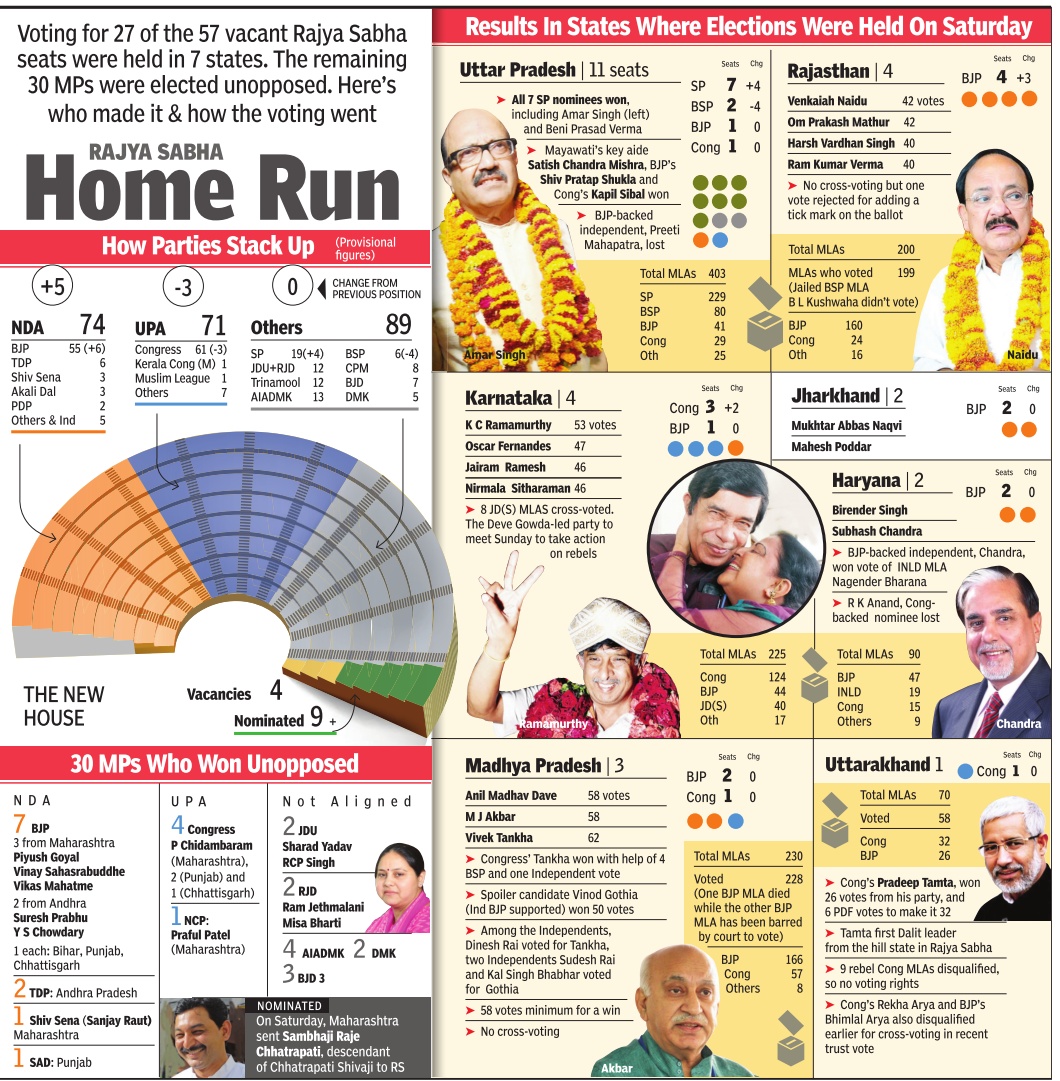
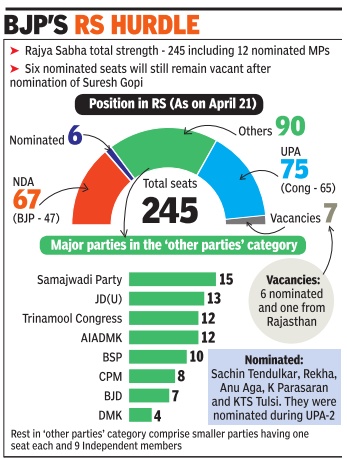
See graphics:
Results in states where elections were held in June 2016
Party Positions, June 2016
Party position in Rajya Sabha, as on 21 April 2016
2018
After bypoll losses, BJP grabs extra RS UP seat, March 24, 2018: The Times of India
March 24, 2018: The Times of India
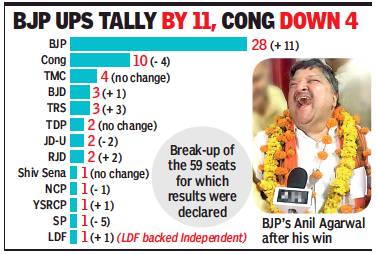
From: After bypoll losses, BJP grabs extra RS UP seat, March 24, 2018: The Times of India
HIGHLIGHTS
All nine BJP candidates from Uttar Pradesh won seats in the Rajya Sabha, thwarting the SP-BSP engine from gaining steam
BJP has won 27 of the 58 seats up for grabs in the Upper House, while the Congress won nine
Results of the two Rajya Sabha seats from Jharkhand are still awaited
Cross-Voting Setback For SP-BSP Bloc
Days after the sobering setbacks in two highprofile Lok Sabha bypolls in UP, BJP had reason to celebrate on Friday by defeating the SP-BSP combine in a high-voltage thriller for the tenth Rajya Sabha seat from the state.
With the results, BJP boosted its Rajya Sabha tally from 58 to 69 (winning 28 of the 59 seats for which results were declared). Congress won 10 seats, a loss of four seats from its current tally of 54.
BJP’s biggest gain was in UP, where, thanks to its landslide win in last year’s assembly polls, eight of its candidates, including finance minister Arun Jaitley, sailed through. SP had enough numbers to deliver the ninth seat to Jaya Bachchan.
RS poll: SP biggest loser, gets just one seat in UP
The last seat went right down to the wire before BJP’s Anil Agarwal prevailed over the joint candidate of SP and BSP, supported by Congress, in a contest marked by cross-voting.
BJP also improved its tally in Maharashtra, winning three of the six seats (a gain of two seats) and Rajasthan, where it won all the three seats (a gain of two). It also wrested from Congress a seat each in Uttarakhand and Haryana.
However, it lost two seats to Congress in Gujarat, where it could win only two of the four seats due to the Congress’s improved performance in the last assembly elections. It also lost a seat to Congress in Karnataka. Similarly, in Bihar too, it lost a seat to the opposition.
The 10th seat in UP became a bone of contention after a surprise pact between SP and BSP with the latter agreeing to back Akhilesh Yadav’s candidates in Gorakhpur and Phulpur LS by-polls in exchange for the transfer of surplus Samajwadi votes for Mayawati’s RS candidate.
Coming in the aftermath of the twin defeats in LS bypolls, the decision to make a run for the seat represented a considerable risk for BJP chief Amit Shah; also because a similarly audacious gambit to snatch the RS seat of Ahmed Patel had not worked last year in Gujarat. A second reverse would have not only raised questions about his high-risk “go-forjugular” style but, more importantly, would have helped SP-BSP amplify the perception of recovery in the wake of bypoll successes.
Agarwal’s victory was facilitated by cross-voting by BSP’s Anil Singh and SP rebel Nitin Agarwal, and Amit Shah’s success in netting the votes of two influential Brahmins from eastern UP — Vijay Mishra of Nishad Party and the controversial Independent Amanmani Tripathi. The gains helped the party make up for the loss of the vote of a BJP MLA who could not vote the right way, as well as the suspected switching over of support of two supporters of party’s inconsistent ally Om Prakash Rajbhar.
Though Agarwal received only 16 first preference votes against 33 notched by BSP’s Bhimrao Ambedkar, the saffron candidate went through because of BJP’s massive advantage in second preference votes, a factor that acquires critical importance in such fluid situations. The disqualification of the vote of a BSP MLA also helped.
Akhilesh did succeed in delivering all the ‘surplus’ SP votes, including that of his estranged uncle Shivpal Yadav, to BSP. Mayawati also ensured that there were, except for the case of Anil Singh, no desertions from the flock, which had in the past often proved to be vulnerable in similar circumstances.
RS elections in Karnataka were highlighted by drama with the JD(S) contingent resorting to a sit-in to protest an alleged nexus between the ruling Congress and the secretary of the Assembly, the Returning Officer, who had to be eventually substituted. The outcome, however, did not throw up any surprises, with Congress winning 3 seats and the remaining one going to BJP’s Rajeev Chandrashekhar.
In Jharkhand, while BJP’s Samir Oraon scored an easy win, the battle for the second seat witnessed a tough contest before Congress’s Tilak Sahu outmuscled BJP’s second candidate Pradeep Sonthalia in what was billed as a battle of resourceful rivals.
Among regional parties, SP was the biggest loser as it managed to win only one seat in UP (it held six of the 10 seats earlier). BSP, which had two of the 10 seats, failed to win a single seat this time.
TRS was the biggest winner among regional parties, winning all three seats from Telangana. In neighbouring Andhra, YSR Congress won one of the three seats, a gain of one seat. BJD won all the three seats in Odisha, an improvement of one seat.
Congress improved its tally from two to three in Karnataka, but it lost two seats each in Telangana and Rajasthan. The party also lost a seat in Maharashtra, where its ally NCP too lost a seat.
Passage of key bills easier for BJP now
Dipak Dash, BJP’s RS victory to make passage of key bills easier, March 25, 2018: The Times of India
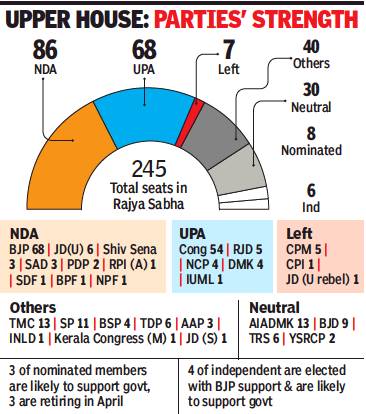
From: Dipak Dash, BJP’s RS victory to make passage of key bills easier, March 25, 2018: The Times of India
BJP’s growing numbers in Rajya Sabha, along with those of its allies, will help Modi government reduce the numerical disadvantage it suffers in the Upper House and, with the help of some regional parties, can put it in touching distance of the majority mark.
The shrinking gap, which will reduce further with the terms of three nominated MPs getting over soon, offers the government the opportunity to negotiate issue-based support from some non-NDA and non-UPA parties. Its support among independents and nominated MPs will add to its ability to get key bills passed.
The party has a majority on its own in Lok Sabha and with NDA partners, the number reached 315 in a House with a current strength of 540.
The tally of seats in Rajya Sabha after Friday’s results shows that the NDA can inch towards the halfway mark of 123 if it gets the support of regional parties such as AIADMK, TRS, YSR Congress and BJD. This can take the tally to 123 (with a few nominated and independent MPs). Though BJP is set to take on BJD in Odisha in the 2019 assembly election, the party has voted for key bills in the past. The data also show that there is still a big block of 115 members, including from UPA, Left and Trinamool Congress, who are unlikely to support the government on a bill where the opposition is rallying against the government.
The government will have the option of improving its strength by nominating new members in place of three who are retiring later next month. Three of the present nominated members are likely to support the government and four of independent MPs are likely to go with the treasury benches.
The government can also try to rope in former ally Indian National Lok Dal, which has just one member in the Upper House, if the issue is crucial enough even though the parties are opposed in Haryana.
While this is a good sign for BJP, which has been struggling in the Upper House since it assumed office in 2014, the stance of its allies after the SP wins in two Lok Sabha bypolls in UP need watching.
2019, May
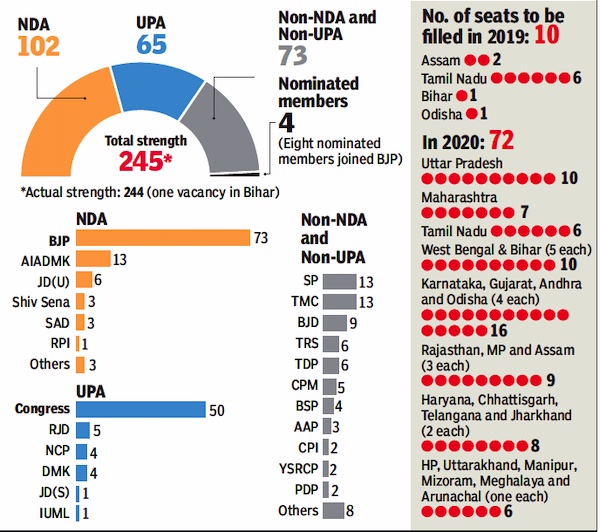
From: May 28, 2019: The Times of India
See graphic:
Party position in Rajya Sabha, as in 2019 May
2019, Dec

From: Akhilesh Singh, Dec 5, 2019 Times of India
See graphic:
The strength of the various political parties in the Rajya Sabha, as in 2019 Dec
2022, March
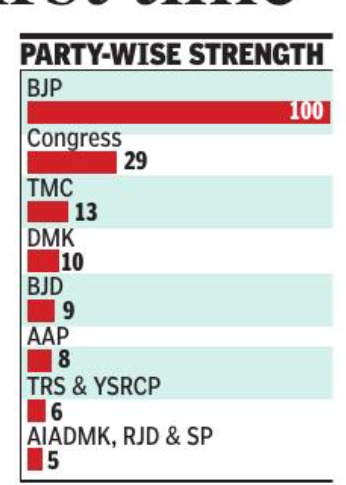
From: April 2, 2022: The Times of India
See graphic:
The party position in the Rajya Sabha in March 2022
Perquisites, misuse of
2019: Railways travel facility
Only 15% of a bill of Rs 7.8 crore raised by the Indian Railways for the Rajya Sabha to pay for travel undertaken by MPs, their spouses and attendants in 2019 accounted for actual travel or journeys completed. The rest are cases of multiple bookings that were not utilised except for the purpose of claiming free travel.
A detailed assessment ordered by vice president and Rajya Sabha chairman M Venkaiah Naidu has resulted in shocking revelations. A former member of the upper house made 63 bookings — nearly 4 bookings every day for 23 days in January, 2019 totalling a whopping Rs 1.69 lakh — which was in contrast to only 7 train journeys he actually undertook, the fare for which was merely Rs 22,085. The Rajya Sabha Secretariat, however, was billed an extra amount of Rs 1.47 lakh for the MP’s tickets that he neither cancelled nor used. Similarly, a sitting member’s claim amounted to only 15% of the bills raised.
The audit conducted by officials of the upper House has led the Rajya Sabha secretariat to issue an unprecedented warning to MPs that they will be made to pay for train tickets that they book, but do not utilise or cancel.
The move, a part of Rajya Sabha’s measures to rein in wasteful expenditure and resultant inconvenience to public, comes into effect immediately. The Lok Sabha secretariat, sources said, has been served an even bigger bill of Rs 23.4 crore for travel undertaken by MPs in 2019. To monitor expenses better, the railways is likely to operationalise a change in software for train bookings by MPs of both Houses.
As part of their allowances, MPs are entitled to one free, non-transferable train journey in first class, air-conditioned or executive class for themselves, free travel by any railway in India with their spouse, if any, and one free airconditioned, two-tier class railway pass for one person to accompany the member when he or she travels by rail.
Question hour
Suspensions of; time spent on
Akhilesh Singh, September 4, 2020: The Times of India
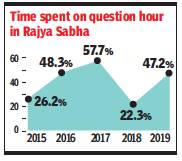
From: Akhilesh Singh, September 4, 2020: The Times of India
Opposition parties may be up in arms over suspension of question hour in the forthcoming monsoon session of Parliament but records show that over 60% of question hour’s time in Rajya Sabha in the last five years was wasted due to disruptions.
Besides, this is not the first time that question hour has been suspended. It had also been done on six previous occasions, the last time when Congress-led UPA was in office in 2009. “A reality check reveals that this spirit of commitment for question hour, given its importance as stated by the opposition, did not reflect in the House during the five year period of 2015-2019. As the ruling party has no majority in Rajya Sabha, opposition parties could not show the same spirit during proceedings in the House,” a senior BJP member said.
The research division of Rajya Sabha secretariat, at the behest of Chairman M Venkaiah Naidu, found that during 2015-19, only about 40% of the total question hour time was used to raise questions and obtain responses from the government. In the five-year period, Rajya Sabha held 332 sittings during which 332 hours were available for question hour at one hour per sitting. However, only 133 hours and 17 minutes were utilised to raise questions and obtain replies from ministers.
Moreover, records showed that question hour was done away with in 1962, 1975, 1976, 1991, 2004 and 2009 for various reasons. Sources said the decision to suspend question hour was taken after presiding officers of both Houses were informed by the parliamentary affairs ministry that the government had consulted political parties and there was a broad consensus. Only TMC was against the idea.
Government sources rejected the opposition’s charge that the session was too short, saying it was convened as per the constitutional provision. “The government wants members to stay in Delhi for a short period and once they perform their responsibilities, they can go back to their constituencies,” a senior member said. Moreover, the session is taking place for 18 days unlike some state assemblies which functioned for one, two and three days.
YEAR-WISE HIGHLIGHTS
2009-14 vis-à-vis 2014-19
RS lost over 95% of Budget session, February 14, 2019: The Times of India
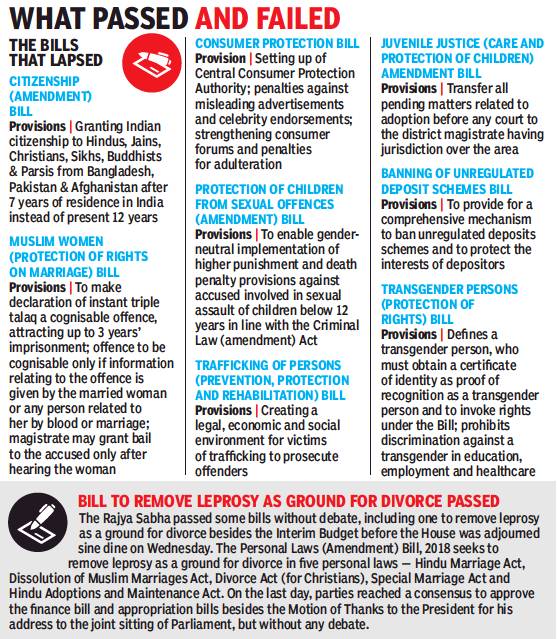
From: RS lost over 95% of Budget session, February 14, 2019: The Times of India
Chairman Naidu Laments Over Low Output Due To Disruptions
Slamming parliamentarians for frequent disruptions of the House, Rajya Sabha Chairman M Venkaiah Naidu said legislative output declined substantially since 2014 and the just concluded Budget session was a “wasted opportunity” with over 95% of time of the 10-day sitting lost.
“With a heavy heart I have to say that this short but important Budget session of Rajya Sabha turned out to be yet another wasted opportunity. This only reinforces the ‘dysfunctional pattern’ that has been evident over the last few years which is a matter of serious concern as it poses a serious threat to parliamentary democracy,” Naidu said in his customary remarks at the end of the session. During this session, productivity of the House has been 4.79%, he said. Rajya Sabha passed five bills during the Budget session, all of which were passed on the last day. Six bills have also been introduced and only 16 Zero Hour submissions were made. No special mention could be made at all.
Of the 18 sessions in the last five years, the productivity of Rajya Sabha was below 60% in eight sessions. One of the main reasons of low productivity of the Upper House was the belligerent attitude of the opposition, which was in majority since the government came to power.
As per official data, since June 2014 when the BJP-led government came to power, Rajya Sabha passed only 149 bills during 18 sessions and 329 sittings — less than a bill in two sittings. This compared to 188 bills passed during 2009-14 with less number of sittings, and 251 bills in 2004-2009.
Naidu said only one bill was passed in the winter session of 2016 and budget session of 2018, while the monsoon session of 2015 passed two bills. Maximum number of 14 bills each were passed during monsoon sessions of 2016 and 2018.
Declining productivity and legislative output is a matter of deep concern, Naidu said, citing pendency of large number of bills in the House. In last five sessions under his chairmanship, Rajya Sabha passed 28 bills — less than a bill in three sittings. He also said he has set up a two-member committee to examine existing provisions for their adequacy to enable smooth functioning of the House.
2014
Winter: 2014
RS completes only 21% of business during winter-2014 session
The Times of India Dec 21 2014
The logjam over the conversion row that has ensured little work was transacted in the Rajya Sabha this week which has brought down productivity in the House to a measly 21%. In comparison, Lok Sabha transacted 105% of the legislative business that was planned.
Analysis by PRS Legislative Research revealed that while Lok Sabha functioned smoothly during Question Hour with nearly 20 questions being answered in this week, Rajya Sabha functioned only 1% of the allotted time with only two questions being answered.
Despite the poor performance in the Upper House the Modi government has little choice but to cool its heels till 2016 when a significant number of opposition members—73---retire. Of the 241 members in the Rajya Sabha, 68 belong to Congress as compared to BJP's 42.
Rajya Sabha worked for 59% of winter session
Dec 24 2014
Himanshi Dhawan
The Rajya Sabha worked for 59% of the time. In 15 of the 22 days, less than three minutes were spent in responding to members' questions in the House. BJP’s low numbers in the RS have led to a near impasse in the last two weeks of the session in December, 2014.
2014-2020: Retirements
While 10 members each retire in the next two years, it is only in 2016 that there will be any dent in the opposition numbers. Among opposition members 21 Congress members, six from BSP, five from JD (U), three each from CPM and SP and two from NCP will retire in 2016. Three nominated and three independent members will also hang up their boots in the same year. Others who will retire include BJP and allies--12 from BJP, three from AIADMK, two each from TDP, Shiv Sena and SAD.
The highest number of MPs set to retire in the next two years is from Uttar Pradesh, including 10 this year, 11 in 2016 and 10 in 2018. After 2016 the highest number of retirees will be 2018 when 67 members of the RS are set to retire.
2018
Jan: finishes entire Zero Hour agenda, a record
January 2, 2018: The Times of India
The Rajya Sabha made a record of sorts as it took up all the Zero Hour issues and special mentions listed in the agenda for that period, Chairman M Venkaiah Naidu said.
"The Rajya Sabha today made a history. For the first time, all Zero Hour submissions, all special mentions were fully completed," said Naidu amid thumping of desks by members in the House of elders.
Naidu said this record depended on the cooperation of the members.
"Your cooperation is good, so my operation was very smooth...that's why the House was able to set this record," he said.
The Chairman expressed hope that in future too, the members would not waste time and stick to the schedule.
Before taking up the Question Hour, he also suggested that the ministers concerned should go through the Zero Hour submissions and special mentions and reply to the members at the earliest as it would enhance productivity of the House.
Uproarious scenes and adjournments have been witnessed on several occasions in the past two weeks due to various reasons during the ongoing Winter Session of Parliament.
In all, the House took up all the 10 listed and one additional Zero Hour submissions.
The members also paid obituary reference to a former member of the House, R Margabandu.
In his Zero Hour mention, Naresh Agrawal (SP) highlighted the "plight" of mediapersons, particularly those working at the district level.
He said there was a trend to hire correspondents on contractactual basis and there was no provision for pension or provident fund for them. Those working at the district level were paid according to the number of stories approved.
Agrawal said media supports the government and if a correspondent writes facts, pressure is built to get them removed.
The SP member also said nine prominent journalists, including Gauri Lankesh and Naveen Gupta, were killed.
He also alleged that mediapersons who were injured in the violence while covering court proceedings relating to self- styled preacher Ram Rahim in Panchkula were not paid for their hospital treatment.
Senior Congress member T Subbarami Reddy highlighted "frequent" close shave at various airports involving aircraft.
In his Special Mention, Motilal Vora (Congress) raised the issue of infant deaths in hospitals of Uttar Pradesh and Gujarat among others.
Other members who made Special Mentions included Ram Nath Thakur (JD-U), R Vaithilingam (AIADMK), Naryana Lal Panchariya (BJP) Husain Dalwai and Chhaya Verma (both Congress).
2022
Monsoon
August 9, 2022: The Times of India
New Delhi: The monsoon session which ended on Monday was to conclude on August 12. It witnessed the Lok Sabha and Rajya Sabha passing seven and five bills respectively. While the Lower House saw a total of 16 sittings that lasted 44 hours and 29 minutes, the Upper House met for 38 hours with as many as 47 hours lost due to disruptions, something which outgoing Chairman Venkaiah Naidu lamented.
During the session, both Houses witnessed an acrimonious debate on price rise. Congress leader Adhir Ranjan Chowdhury’s ‘Rashtrapatni’ remark on President Droupadi Murmu led to adjournments in Lok Sabha as a war of words broke out between opposition and treasury benches. The issue reached a flash-point when Union minister Smriti Irani sought an apology from Congress chief Sonia Gandhi.
During the session, the Lower House passed seven legislations, including Indian Antarctic Bill, Family Courts (Amendment) Bill, National Anti-Doping Bill, Wild Life Protection (Amendment) Bill, and Central Universities (Amendment) Bill, and Energy Conservation (Amendment) Bill.
Referring to the Question Hour, Speaker Om Birla said oral answers were given to 46 starred questions during the session. Members raised 318 matters of public interest before the House under Rule 377. During Zero Hour, members raised 98 matters on key issues.
See also
Parliament: India (general issues): Issues that pertain to both the Rajya Sabha and the Lok Sabha.
The 15th Lok Sabha: 2009-14: Productivity
The 16th Lok Sabha (2014-19): MPs
The 16th Lok Sabha (2014-19): trends
The 17th Lok Sabha (2019- 24): trends : Trends in the Lok Sabha Elections.
The 17th Lok Sabha (2019-24): MPs: A complete list of the MPs elected in 2019.
The 17th Lok Sabha: 2019-24: Productivity and work done session by session Productivity, and work done session by session
The 18th Lok Sabha (2024- ): MPs: A complete list of the MPs elected in 2024.
The 18th Lok Sabha (2024- ): trends: Trends in the Lok Sabha Elections.
The 18th Lok Sabha: 2024- : Productivity and work done session by session
Rajya Sabha
